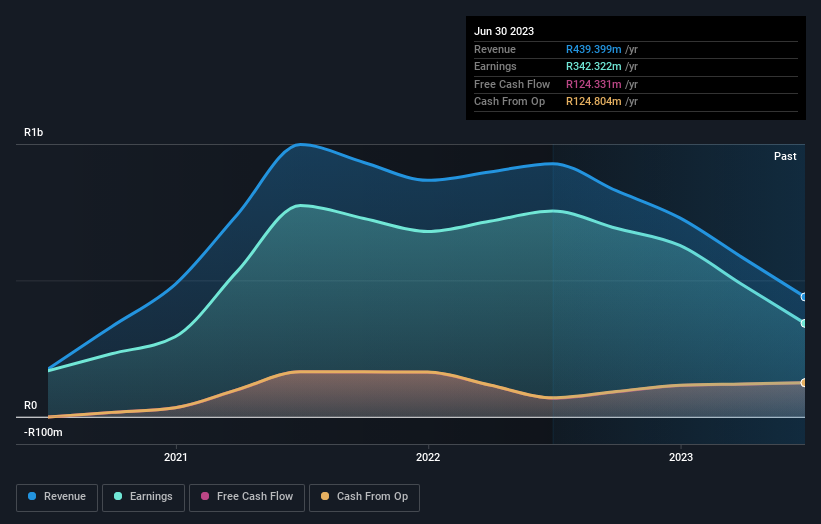With 42% ownership, Sabvest Capital Limited (JSE:SBP) insiders have a lot at stake
Key Insights
Sabvest Capital's significant insider ownership suggests inherent interests in company's expansion
50% of the business is held by the top 2 shareholders
To get a sense of who is truly in control of Sabvest Capital Limited (JSE:SBP), it is important to understand the ownership structure of the business. The group holding the most number of shares in the company, around 42% to be precise, is individual insiders. Put another way, the group faces the maximum upside potential (or downside risk).
So it follows, every decision made by insiders of Sabvest Capital regarding the company's future would be crucial to them.
In the chart below, we zoom in on the different ownership groups of Sabvest Capital.
Check out our latest analysis for Sabvest Capital
What Does The Institutional Ownership Tell Us About Sabvest Capital?
Institutional investors commonly compare their own returns to the returns of a commonly followed index. So they generally do consider buying larger companies that are included in the relevant benchmark index.
We can see that Sabvest Capital does have institutional investors; and they hold a good portion of the company's stock. This can indicate that the company has a certain degree of credibility in the investment community. However, it is best to be wary of relying on the supposed validation that comes with institutional investors. They too, get it wrong sometimes. It is not uncommon to see a big share price drop if two large institutional investors try to sell out of a stock at the same time. So it is worth checking the past earnings trajectory of Sabvest Capital, (below). Of course, keep in mind that there are other factors to consider, too.
Sabvest Capital is not owned by hedge funds. The company's CEO Christopher Seabrooke is the largest shareholder with 41% of shares outstanding. With 9.5% and 7.4% of the shares outstanding respectively, Eric Ellerine Trust (Pty) Ltd and InsingerGilissen Asset Management N.V. are the second and third largest shareholders.
After doing some more digging, we found that the top 2 shareholders collectively control more than half of the company's shares, implying that they have considerable power to influence the company's decisions.
While studying institutional ownership for a company can add value to your research, it is also a good practice to research analyst recommendations to get a deeper understand of a stock's expected performance. We're not picking up on any analyst coverage of the stock at the moment, so the company is unlikely to be widely held.
Insider Ownership Of Sabvest Capital
The definition of company insiders can be subjective and does vary between jurisdictions. Our data reflects individual insiders, capturing board members at the very least. Management ultimately answers to the board. However, it is not uncommon for managers to be executive board members, especially if they are a founder or the CEO.
I generally consider insider ownership to be a good thing. However, on some occasions it makes it more difficult for other shareholders to hold the board accountable for decisions.
Our most recent data indicates that insiders own a reasonable proportion of Sabvest Capital Limited. It has a market capitalization of just R2.7b, and insiders have R1.2b worth of shares in their own names. We would say this shows alignment with shareholders, but it is worth noting that the company is still quite small; some insiders may have founded the business. You can click here to see if those insiders have been buying or selling.
General Public Ownership
With a 31% ownership, the general public, mostly comprising of individual investors, have some degree of sway over Sabvest Capital. While this size of ownership may not be enough to sway a policy decision in their favour, they can still make a collective impact on company policies.
Private Company Ownership
Our data indicates that Private Companies hold 9.5%, of the company's shares. It might be worth looking deeper into this. If related parties, such as insiders, have an interest in one of these private companies, that should be disclosed in the annual report. Private companies may also have a strategic interest in the company.
Next Steps:
While it is well worth considering the different groups that own a company, there are other factors that are even more important. Be aware that Sabvest Capital is showing 1 warning sign in our investment analysis , you should know about...
Of course this may not be the best stock to buy. Therefore, you may wish to see our free collection of interesting prospects boasting favorable financials.
NB: Figures in this article are calculated using data from the last twelve months, which refer to the 12-month period ending on the last date of the month the financial statement is dated. This may not be consistent with full year annual report figures.
Have feedback on this article? Concerned about the content? Get in touch with us directly. Alternatively, email editorial-team (at) simplywallst.com.
This article by Simply Wall St is general in nature. We provide commentary based on historical data and analyst forecasts only using an unbiased methodology and our articles are not intended to be financial advice. It does not constitute a recommendation to buy or sell any stock, and does not take account of your objectives, or your financial situation. We aim to bring you long-term focused analysis driven by fundamental data. Note that our analysis may not factor in the latest price-sensitive company announcements or qualitative material. Simply Wall St has no position in any stocks mentioned.


